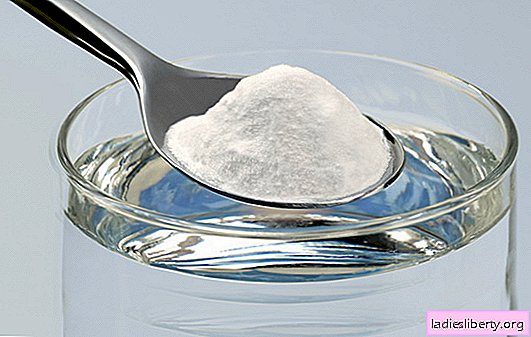
Soda cannot be attributed to obsolete ingredients.
Despite the emergence of new-fashioned additives for the embodiment of culinary ideas, housewives do not remove available and easy-to-use powder from their kitchen shelves.
Passion for many women environmentally friendly ways caring for your own home has returned soda to its former relevance.
Soda was found to be used both in cosmetology and in medicine.
Having become pregnant, women do not change their habits and find ways to use soda in this period of their lives. But how safe and effective are the invented methods using soda during pregnancy?
How to determine pregnancy with soda?
There are many exotic ways to determine pregnancy with improvised means. Either mistrust of the results of test strips, or confidence in the effectiveness of grandmother’s methods pushes women to do such experiments.
One well-known and widely discussed method is the soda test.
Indeed, some women consider the method of determining pregnancy with soda not only relevant, but also effective. Doctors categorically do not support such optimism and warn people who are keen on folk methods of diagnosing natures about the unreliability of the results.
To resort to this option of determining pregnancy or not, it is up to the woman herself. But the soda test will definitely not do any harm. Is that inspire empty hopes or prematurely disappoint.
How is a soda test carried out?
For a home lab, test tubes or sophisticated devices and indicators are not needed.
All components of the test are a small sterile container and a spoonful of soda itself.
First of all, a woman needs to collect urine in a sterile container. According to all the rules of diagnosis, urine is collected only in the morning after a night's rest. It is such urine that has more accurate chemical and physiological parameters.
For the study, 150 ml of urine will be enough. Pour baking soda into fresh, freshly collected urine.
From what kind of reaction is observed, draw the appropriate conclusions:
1. If a reaction occurs with hissing and foam formation, there is no talk of pregnancy.
2. If urine does not react in any way to the presence of soda, which slowly settles in the form of sediment, pregnancy is very likely.
Why is the reaction of urine to the presence of soda different? What is the difference between the urine of a pregnant woman and the urine of her non-pregnant girlfriends?
Remember chemistry
All fluids in the body have their own acidity. This allows the organs in which the liquid substance is located to perform their functions and not be exposed to irritating effects.
So, for the bladder, neutral or slightly acidic acidity is considered normal. PH values range from 4.5 to 8. A higher value indicates an alkaline environment. With a decrease in pH, urine acidification is observed.
Soda is an alkaline element. It is required to react with acids. Therefore, getting into urine with an acid or even slightly acid pH level, soda provokes a natural chemical reaction.
If urine has alkaline characteristics, in principle, no reaction can occur when mixed with soda.
The theory of soda test is based on the fact that in a pregnant woman the urine becomes alkaline, which is confirmed by the lack of reaction to soda.
It seems that logic is present in such reasoning. Why, then, doctors categorically reject such a simple and affordable technique?
We turn to physiology
Urine refers to the waste products of the human body. With it, not just excess fluid is excreted. In urine, there are various water-soluble elements, which, after careful filtration in the kidneys, are excreted from the body as waste and unnecessary particles.
The composition of urine is influenced by various factors, from the foods that a person consumed to the state of the urinary system.
The acidity of urine is not constant, its indicators can change during the day under the influence of temperature and physical condition of a person.
Alkaline indicators are present:
• if there is blood in the urine;
• for infections of the genitourinary organs;
• with dehydration caused by diarrhea or vomiting;
• with abnormalities in the work of kidneys of various etiologies;
• if vegetarian dishes prevail in the diet;
• under the influence of increased cortisol production;
• with alkaline therapy.
Urine in such cases will have a pH close to 8. Accordingly, a soda test will be false positive.
Urine acidity may increase:
• for lovers of protein diets;
• with prolonged fasting;
• after eating beaks or citrus fruits;
• with fever;
• in diabetics;
• under the influence of kidney tuberculosis;
• with physical exhaustion;
• during colds accompanied by fever.
In these situations, urine will show a pH close to 4.5. The reaction to soda will be quite stormy, but in fact the results are false negative.
During pregnancy, urine readings do not change significantly, but the predominance of concomitant factors makes the results of soda testing negligible.
To summarize
Pregnancy detection with soda can most likely be attributed to home experimentation or entertainment. Trusting such a method is quite risky.
You can, of course, compare the results of soda testing with the answers of real diagnostics. But rely only on this method is not worth it.
Doctors knowingly sound the alarm, warning women who have trusted amateur methods of confirming pregnancy about lost time and opportunities.
Of course, there are times when it is not possible to visit a doctor or get a test. Even far from civilization, you can find a spoonful of soda, and it will be very handy to dispel doubts on your own.
But in most cases better to play it safe and conduct a home pregnancy diagnosis using pharmacy test strips. The error of the results in this case will be less than 1%.
If the tests are not credible, and you can’t wait to learn about pregnancy, you can donate blood in any laboratory. This is the most reliable way to determine early pregnancy in very short periods.
Can I take soda during pregnancy from heartburn?
Among the inhabitants, a well-known method of treating heartburn with soda is common. The method is quite effective. But how safe is it, especially for pregnant women.
Why do pregnant women get annoyed with heartburn?
The causes of heartburn are many. But in normal situations, an unpleasant burning sensation is associated with diseases of the gastrointestinal tract and nutritional errors.
Women bearing a child are quite careful about their health. And rarely does anyone allow themselves to experiment with food. Heartburn provoking factors in the form of fatty, salty, sour dishes are rarely seen on the pregnant menu.
Why then are women worried discomfort as:
• burning behind the sternum, in the throat;
• feelings of general discomfort;
• nausea;
• sour taste in the mouth.
Changes in the body of a woman that occurred during pregnancy played a role here.
The hormone progesterone, which increases significantly during pregnancy, has a relaxing effect on all muscle tissues in the body. The stomach and esophagus, which are responsible for the promotion and digestion of food, are actually hollow muscle organs.
Between them, to avoid food reflux, the sphincter is located, which reflexively closes tightly after swallowing. Such a natural locking mechanism does not allow the food lump to penetrate in the opposite direction.
During pregnancy, the muscle tissue of these organs is weakened and unable to properly perform their functions. Therefore, the contents of the stomach can penetrate the esophagus. Given that the stomach is constantly supported by an acidic environment, the stomach masses, irritating the mucous membrane of the esophagus, cause an unpleasant burning sensation.
With the growth of the baby, the stomach increases and presses on almost all internal organs. The stomach was no exception. Increased abdominal pressure and displaced walls of the stomach increase the risks of food moving in the opposite direction.
Therefore, pregnancy is attributed to the provoking causes of heartburn. Impossible to influence the process. The remedy for women with heartburn is only symptomatic therapy.
Why does soda help with heartburn?
In the stomach, hydrochloric acid is constantly produced to digest food. Therefore, the environment of the stomach is saturated and acidic. It is this acid that causes irritation of the esophagus, which feels like burning.
When soda enters the stomach, a natural chemical reaction occurs. Soda actually neutralizes acid. And the patient instantly feels relief. It is logical to conclude that soda is an effective remedy for heartburn.
But what happens next? The chemical interaction of alkaline soda and hydrochloric acid of the stomach ends with the formation of:
• sodium chlorine (common salt);
• neutral water;
• carbon dioxide (CO2).
Carbon dioxide provokes increased formation of gastric juice. Literally after 20-30 minutes, acidity indicators increase significantly. And heartburn returns with enhanced effect. Such a phenomenon has received the name "acid rebound" in medical practice.
Therefore, the treatment of gastric pathologies with soda is unjustified and rather risky.
What are the risks of soda treatment during pregnancy?
But this is not all the delights of treating soda.
A pregnant woman with soda in the body increasing threat:
1. The appearance of puffiness due to excess sodium salts in the body.
2. Alkalization of blood and urine, which affects the stability of the urinary system, promotes the formation of calculi (stones).
3. Disruptions in the intestines due to imbalance in the flora.
4. With prolonged alkalization of blood, the rhythms of the vascular system are disrupted.
Having such a list of side effects in the arsenal, is it worth taking soda during pregnancy from heartburn?
In extreme cases, when a woman is tormented by burning, and there are no authorized medications at hand, doctors allow one-time soda during pregnancy from heartburn. But on an ongoing basis, getting involved in this way is quite risky.
It is much safer to take all measures to prevent heartburn. For this, it is recommended not to take a lying position after a meal, to eat food in small volumes and to get rid of squeezing clothes. If you still can’t overcome heartburn, you can use drugs such as Rhenia, Smecta or Maalox that are allowed during pregnancy.
Before resorting to "reliable" folk methods of treatment and diagnosis with soda, evaluate all the risks of such experiments and make a balanced and safe decision for the baby.











